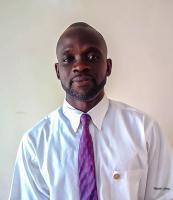
I see that you write poetry in recognizable and named forms: haikus, rengas, and others. Why do you choose those forms? Does it depend on the poem?
There’s something self-fulfilling about Japanese poetry form to me; I easily identify with it, it makes me one with nature, hence I exist with utter independence with the fowls of the air, the flowers and trees, and the changing seasons of mankind. When I write I catch the spirit, thus I flow where the poems want me to go, I don’t choose.
Why do you choose to write in form at all? Some artists have broken away from traditional form, but why do you think form still has value for what you’re hoping to communicate?
I started off with free verse, and that form helps me flow with the natural rhythm, giving me the liberty to express myself, allowing sense of flexibility, creating a conversational and fluid feel. However, the japanese form have improved how I write free verse, if you’ve seen some of my current work, it is infused with tan-renga.
You write collaborative poetry with other artists. How did you meet Christina Chin and others with whom you write, and what does the collaborative process look like? Do you simply trade off and finish each other’s poems, or do you brainstorm a topic and direction first?
Collaborations help me see the world clearly for what it is: “the way you do a thing, is how you will do everything.” The process of collaborations introduces you to a new perspective, and a new way of thinking and approaching things. I love it! My teammate Christina Chin and I met at Lothlorien Poetry Journal where we were both published as per that time. We both write as it comes: I throw her a couple of verses, she finishes it up; she does the same as well. So, that is how we flow — no guidelines — no rules — nothing leads but the spirit of poetry!
What is the literary scene like in Nigeria? What sorts of poems do people enjoy there, and what has it been like to get published there?
I stand to be corrected — traditional form as Haiku, Renga don’t get published here; only free verse form. And as a result, you can see that being a Haiku poet here is highly challenging — and a disservice to one’s career. The literary scene in my homeland is a growing industry that’s in a dire need of government present and support to thrive well in this fast-pacing times — a country that is littered with amazing talents, thus if given the necessary programs and opportunities, these words bursting out of one’s veins will gain wings and flyaway.
What roles do you think poets, and poetry, play in modern global society? Do you have something you hope to accomplish by serving as a poet?
I will begin with Shelley’s idea in ‘The Defense Of Poetry’ 1821, “Poets are the unacknowledged legislators of the world.” The words and voices of poets have echoed through different times and ages, breaking hurdles and transcending barriers. Poetry can be a powerful teaching tool, that is necessary in enlightening the human body, mind, and spirit. Serving as a poet is a calling that I am magnifying greatly; I want to serve this war-torn world with words that carries beauty and truth. If this is achieved, I am fulfilled, and it will be my crown of laurels.
Who are some other poets or writers you admire, and why?
For the Japanese traditional form I think I admire Matsuo Bashō; I also admire the poet Christopher Ifekandu Okigbo because he died fighting for what he believed in, the independence of Biafra.
What are your next steps, where do you plan to go in the future with your writing?
I want to see the world for what it is. I want poetry to take me to strange places; I want to see different people, learn different languages and dialects and cultures — I want a baptism of full immersion in the only global faith: Poetry.
Uchechukwu Onyedikam is a Nigerian Photographer and, a well-published Poet based in Lagos, Nigeria. His poems have appeared in Amsterdam Quarterly, Brittle Paper, Poetic Africa, Hood Communists, The Hooghly Review, and in different themes of anthology both print and online. He and Christina Chin has co-written and published two poetry chapbooks — Pouring Light On The Hills (December 2022) and Clouds of Pink (March 2024).
